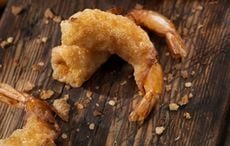Cathal Armstrong cooked for Julia Child. Twice.
The normally unflappable chef remembers the day when Julia Child turned up unannounced. He was working at Bistro Bis, a popular brasserie on Capitol Hill.
“I had nothing ready,” Armstrong says. “So I cooked for her off the cuff.”
A certain gleefulness enters his voice as he recalls that she came back the next day with celebrity chef Jacques Pépin and signed a book for him. “To Cathal, a great chef,” it read. “From Julia, a home cook.”
That was seven years ago, before Armstrong and his wife and business partner Meshelle had opened his first of three restaurants in Virginia.
The Armstrongs and partner Todd Thrasher also own and operate Eamonn's A Dublin Chipper; PX, the upstairs speakeasy lounge; and the historic eatery the Majestic, all within five blocks from Restaurant Eve.
Sitting at a table at Restaurant Eve, a quaint yet sophisticated 100 seat dining experience located in Old Town, Alexandria, Armstrong talks about some of the celebrities he has cooked for.
He cooked a private dinner for George W. Bush in the White House residence, and hosted a fundraiser at the Majestic “for a very little known senator from Illinois about two years ago, at the beginning of a presidential campaign.” Michelle Obama came back to eat there once she was first lady.
His favorite guest to cook for, however, was the late Senator Ted Kennedy, who he cooked for “at least 100 times at Bistro Bis.” As soon as Kennedy heard Armstrong’s accent, he realized he started introducing him to all of his Senate friends as “our chef.”
“He liked his liver and onions,” Armstrong says.
Armstrong grew up in a suburb of Dublin called Killiney, “Which is where Bono's house is, actually,” he notes with a chuckle. “But we didn't live in that neighborhood. We lived on the other side of town.”
He went to a small, all Gaelic-speaking school, played hurling for the Dublin minors and moved to the United States in 1990, just two weeks short of his 21st birthday. He landed a job at Murphy's Irish Pub in Woodley Park, and the plan was to “earn some fast cash and get out of the restaurant business” and head back to London to attend culinary school.
“That was about 19 years ago,” laughs the man who got his U.S. citizenship about five years ago but still thinks in Irish.
Armstrong describes his life as the “quintessential American dream story.” He applied for a green card in the Morrison visa lottery, eventually landing one of the visas aimed directly at Irish immigrants.
It would not be the only time his Irish heritage would help him out. He met his wife when he was making pizzas part time at a restaurant she managed, and they “went out dancing one night and one thing led to another.”
“The movie The Commitments had just come out and she had just seen it, and everybody was all enthralled with Irish at the time and horses in elevators and that sort of thing,” Armstrong says. “So I think she was a little smitten with me because of the movie.
Now his wife, who was born in the Philippines, is “close enough to Irish citizenship,” and Armstrong is teaching his young kids, Eve, 10, and Eamonn, seven, a few Irish words.
“Seas suas,” he says in an airy accent. “Stand up.”
“Sí sios -- sit down.”
“They're good words to start with kids,” he says, erupting into that easy smile of his.
Talking to Armstrong is bit like pulling up a stool at your local pub and lucking into good company -- there is a passion and excitement underlying everything he says, especially when he's talking now about his own early and unlikely introduction to food.
His dad was a tour operator, and had people working for him “who lived in Benidorm, the Canary Island and Costa Rica and Costa Brava, Tunisia and Greece.”
His father, “a great natural cook and a hobby gardener,” was always learning from his friends how to cook paella and couscous and “all this crazy stuff no one in Ireland ate.”
“We would be sitting at the table on six out of seven nights, and he'd say, 'No one in Ireland is eating this dish,' and it was true,” Armstrong says.
Even the fish they ate on Fridays, “because that was the Catholic rule,” received special treatment. “My friends, all of them, had frozen fish fingers,” he says.
“But that would be sacrilegious to my father who went to the fish market on Friday to buy fresh fish, caught from the sea that day.”
Armstrong has stayed true to his father's ideal.
“Cathal Armstrong really cares about the provenance of the food he serves at Restaurant Eve,” says food priestess and Chez Panisse impresario Alice Waters. “He serves local, organic fruits and vegetables, grass-fed beef, and even has a kitchen garden growing out back.”
Waters came to Washington, D.C. shortly after Obama's inauguration. She came to visit the gardens at Monticello and also cut a straight path across the Potomac to Armstrong’s Restaurant Eve, in Alexandria, Virginia’s Old Town.
In addition to the garden, Armstrong has a 34-seat tasting room which features a five and nine course prix-fix tasting menu which reads like a what's-what of fresh, local and seasonal creations paired with and inventive cocktails from sommelier and resident mixologist Todd Thrasher.
Armstrong focuses on dishes that the restaurant does really well, with produce provided by local farmers. He throws in the occasional “aggressive dish” like sweetbreads or skate. The food also reflects his mood.
“If I'm angry you can tell,” he laughs.
“Angry dishes” usually include more vinegar and olive oil, he explains. It is nothing intentional, but his feelings just pour over into his food.
“The sea is calm this evening,” he assures.
Invariably the conversation turns back to Ireland. The words flow in almost complete, uninterrupted paragraphs.
“It's an agriculturally wealthy, wealthy county,” he says, picking up speed. “The reason it's so green is the mild weather and the rain. But because of that, you have grass growing, so you can raise amazing beef and amazing lamb.
“It's an island so it has some of the most amazing seafood you can find anywhere in the world. And again, because of the temperate climate, you can grow crops year round outside. So there is a wide, wide range of amazing foods available. We've seen cheeses like Ardrahan, equal to if not better than some of the best cheese made in the world.”
Armstrong is talking about the semi-soft cow's milk cheese from Co. Cork, with its earthy undertones and zesty tang, which he serves in his restaurants.
“I don't show them just because they're Irish,” Armstrong says. “I show them because they're Irish and they're that good.”
His restaurant Eamonn's A Dublin Chipper, is an Irish pub thru-and-thru, from the fresh fish and hand-cut chips down to the “mushy peas” and Irish sodas and candies.
“We make all our own bacon in the Irish style here,” he says. “It's brine cured pork so it's pink all the way through, and we do this really great sandwich for lunch. It's an Irish B.L.T. It's really delicious. It's like a rasher sandwich.”
He uses “subtle hints of Irish ingredients,” the Kerrygold butter, the artisanal cheeses like Ardrahan and Cashel Blue, and he also makes his own versions of Irish specialties like white pudding and black pudding, but Restaurant Eve is “definitely an American restaurant, and I'm proud it's an American restaurant.”
It is also a showcase for the best of what Ireland has to offer. It combines everything he loves about his two countries. And that mix is what attracted him to America in the first place.
It's kind of corny,” Armstrong says. “I was born in Ireland but I was made in the USA.”




Comments